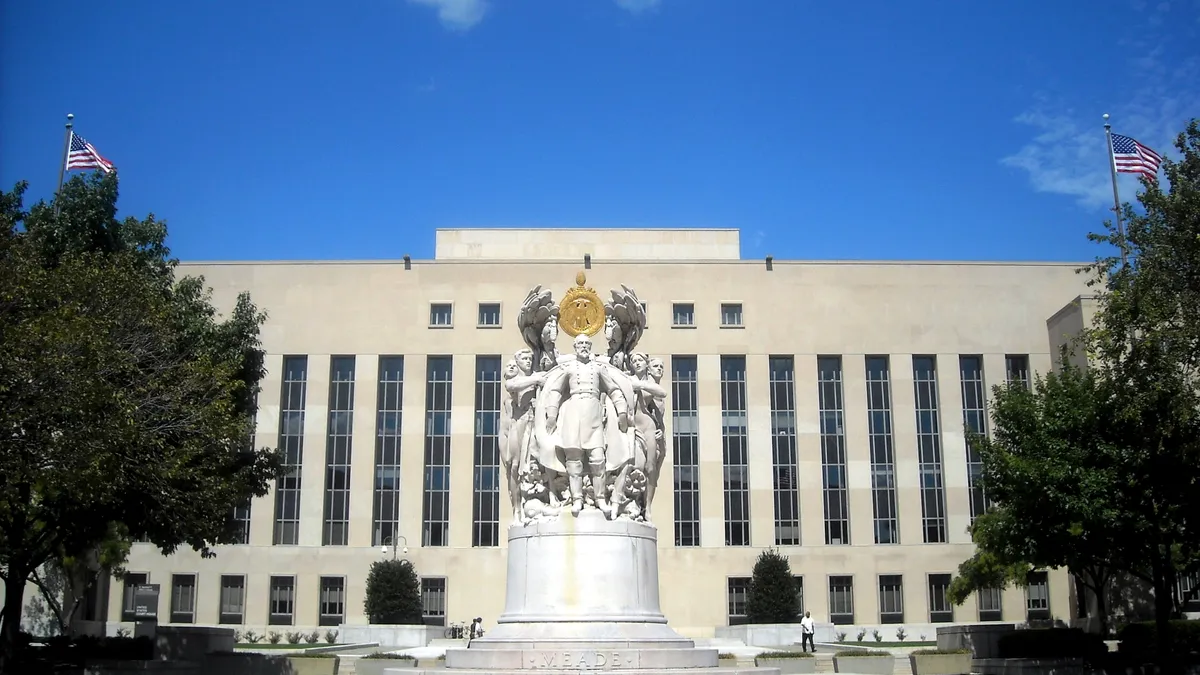Dive Brief:
-
The U.S. Court of Appeals for the D.C. Circuit on Tuesday found federal regulators did not go far enough in considering environmental justice and climate impacts in their approval of two gas infrastructure projects.
-
The opinion, which remanded the Federal Energy Regulatory Commission's 2019 approval of two liquefied natural gas (LNG) export terminals and associated pipeline facilities, is the latest court decision consistent with FERC Chair Richard Glick's stance that the commission should go farther in analyzing whether the gas projects it assesses are contributing to the climate crisis or causing harm to local communities.
-
According to the companies behind the projects, including Texas LNG and Rio Grande LNG, the ruling will likely not end commercial development of the facilities, but rather serves as a "reminder" to ensure these companies are keeping factors including environmental justice and climate change in mind.
Dive Insight:
Critics have long accused FERC of "rubber stamping" projects, a criticism Glick has often agreed with. In his dissent on the commission's 2019 approval of the Rio Grande and Texas LNG projects, he argued that FERC was not allowed under federal law to "assume away" the impacts of these projects, and that their assessment at the time was inadequate.
The Tuesday decision "clearly demonstrates that the Commission has the authority and obligation to meaningfully analyze and consider the impacts from GHG emissions and impacts to Environmental Justice communities," Glick said in a statement. "Moreover, failure to do so puts the Commission's decisions – and the investments made in reliance on those decisions – in legal peril."
In the commission's environmental analysis of the projects, it found that it could not determine what the facilities' impacts on the climate crisis would be, because there is no universal methodology for calculating those impacts. But petitioners argued FERC could use the social cost of carbon or some other generally accepted metric to make that evaluation. Ultimately, the court agreed that the commission could have tried harder in 2019 to make this assessment.
"This court is saying you really do actually need to try to evaluate impacts based on whatever information is either out there in the real world, or that is based on academic or other research," said John Moore, director of the Sustainable FERC Project at the Natural Resources Defense Council. "Before you say you can't do it, you need to try a lot harder."
The D.C. Circuit's decision remands the decision back to FERC to review again, and will not necessarily stop the projects from being completed. The court found that the commission's analyses of the projects' contribution to the climate crisis and their impacts on environmental justice communities were "deficient" under the National Environmental Policy Act, the Natural Gas Act and the Administrative Procedure Act, but does not vacate the orders. Ultimately, the court says the commission "is likely to remedy any deficiencies" of its previous ruling on the projects when it reviews them on remand.
"The DC Circuit's opinion is a reminder that environmental justice, energy transition, and climate change are some of our most important generational issues," said a spokesperson from Texas LNG in an email, adding the company "has taken tremendous actions to ensure the project is a market-leader on these issues."
"We are pleased the Court affirmed the validity of the FERC authorization of our Rio Grande LNG project and we look forward to the FERC's response to the Court's requests," said Matt Schatzman, NextDecade's Chairman and CEO in a statement.
Tuesday's ruling is the latest in a series of court decisions finding that FERC is not thorough enough in assessing the impacts of gas projects. A landmark 2017 decision from the D.C. Circuit directed FERC to assess the downstream impacts of greenhouse gas emissions related to pipeline projects, a ruling Glick has often cited when arguing commission should pursue a more rigorous environmental impact assessment of gas projects. Another recent ruling from the D.C. Circuit vacated the commission's approval of a pipeline in St. Louis, Missouri, in a rare move against an operational project, putting into question whether the project will still be able to deliver gas.
Meanwhile, FERC is revisiting its 1999 pipeline certification policy that dictates how the commission analyzes projects. Glick and Commissioner Allison Clements are largely in agreement that the commission should be more robust in analyzing project impacts, but with the pending departure of FERC's fifth commissioner, it's unclear how that proceeding will play out.















